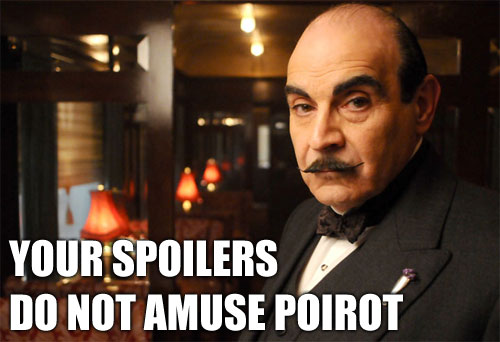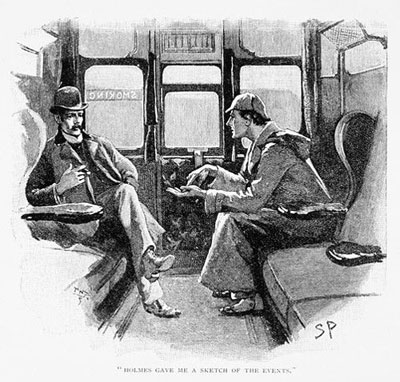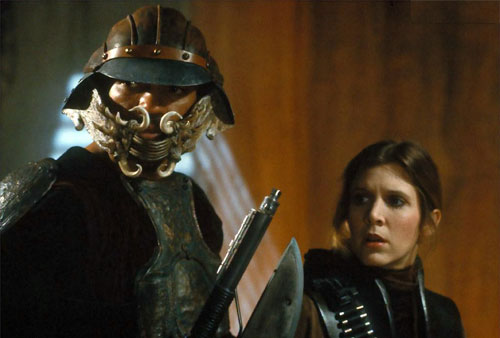
Annalee Newitz posted a story on io9 yesterday referencing a recent study from UC San Diego. The gist of the study’s findings is that having fiction spoiled for you before you consume it actually makes you enjoy it more. According to Nicholas Christenfeld of UC San Diego’s psychology department, “Plots are just excuses for great writing. What the plot is is (almost) irrelevant. The pleasure is in the writing.” While I agree that the quality of the writing itself is an essential component in good storytelling, it’s impossible to tell an engaging narrative without a sturdy plot to hold it up. Plot is just as necessary as the writing itself, and I could not disagree more with the way the researchers interpreted their findings.
These days, society operates on a short attention span model with constant demands for immediate intellectual gratification. Having Wikipedia at our disposal and constantly accessible through our smartphones means we’re never more than a couple of minutes away from satisfying our curiosity about nearly anything and everything. We live in a wildly different world than the one we inhabited just a few years back, when people would have lengthy arguments about esoteric facts without a way to immediately clear things up. Research no longer involves putting effort into hitting up the physical library or having actual discussions. Now we can just shoot a phrase into Google and yank back forty zillion corroborations of a trivia answer. In short, getting answers used to take time, and now it’s virtually instantaneous. In fact, another recent study posits that our reliance on the Internet is actually diminishing our ability to remember things we think we can look up again online later. We’ve become so used to having this second brain flying along with us in the digital cloud that we slip into frustration and even near-panic when we have to use our own faculties to figure something out without the aid of our immediate answer-bots.

Our reliance on immediate knowledge has spread for many people from practical needs into their entertainment, and they no longer are content to wait for the next big movie release, the following week’s TV episode, or the next comic book issue. They have a need for immediate gratification, and that means they want to know everything about what they’re into right away. The big surprise at the end of a well-crafted mystery no longer holds the “Aha!” value it once did, because the audience now feels like they have to wait for a denouement that they were owed at the beginning of the story, if not even prior to the start. This thirst for spoiling the surprises is something the studios and publishers used to actively fight. I can remember the days when scrounging up details about the next Buffy season finale took concerted effort, and fans were able to speculate and have actual conversations about how Lando would be able to rescue Han from Jabba (and even about what Jabba might look like). It’s a totally different cultural landscape today.

The studios have cottoned on to the growing addiction to spoilers, and they have crossed the line from concertedly preventing knowledge leaks to actually helping them along. To my own frustration, it has become ever harder to see a new movie without having had the entire plot summarized for me in a trailer prior to the release. And there’s really no such thing as surprise appearances or character reveals on TV shows now, as the producers love trotting the cast members out to reveal all at the Comic-Con panel before the new season starts. Comic books are even worse, with the publishers giving exclusive interviews to USA Today that give away hugely significant plot turns before the comic issues hit the stands. You’d be hard pressed to find any comic fan who didn’t already know what was going to happen in the recent (spoiler warning for the following links) Hellboy: The Fury #3 or Ultimate Fallout #4 before even having a chance to read the issues. We’ve reached a point where the actual artistic product is almost irrelevant because the audience already has had its curiosity sated long before cracking open a book or sitting down to watch a show.

I realize and acknowledge that I am in an ever-diminishing minority of fans still standing firmly against the information overload of spoilage. Many years ago at Dragon*Con, when the late Jeff Conaway was about to reveal an upcoming plot point from the then-airing Babylon 5, the audience at his panel stopped him by shouting, “Don’t ruin our show!” He gamely apologized and backed off from the tidbits he was about to reveal. I am still in that audience, cringing at the thought of having my joy ruined by knowing too much too early. Part of the fun of fiction is in the mystery and the wonder of not knowing what’s around the next turn. Having too much foreknowledge excises the suspense and tension, and it results in a story playing out very differently from the way in which it was originally written. It’s not about being the first on the block to know how A Game of Thrones ends. It’s about experiencing the emotions along with the characters and learning how things turn out in the order and timing the writers intended.

It saddens me that most consumers of entertainment have gone with the flow and now actively enjoy having their entertainment spoiled. As sad as it may be, it is a truth, and I believe the results of UC San Diego’s study reflects that shift in audience expectations. The fact that so many people in the study claim to enjoy a story more after having it spoiled does not surprise me, but the conclusions the researchers draw seems to suggest that the stories themselves always would be better by giving up the surprises in advance. As Inga Kiderra writes, “the researchers are careful to note that they do not have a new recipe for writers to follow.” Nevertheless, they seem to think writers could learn something important from their study. That’s where I disagree, and I find that conclusion almost insulting.

The works the researchers presented to their readers include stories by Agatha Christie, John Updike, and Roald Dahl. These are writers creating classic works of literature in bygone eras and who knew nothing of our current culture of immediacy. When Christie penned her mysteries, she beseeched her readers not to spoil the endings, and she wanted her fans to play along with Poirot and Marple as they pored through clues to eventually discern the killer’s identity. Having an audience member stand up at the beginning of The Mousetrap and shout the spoiler to a packed house would not make the play more enjoyable; rather, it would disservice the story and directly counter and dishonor the author’s purpose in creating it.

There is no denying that a large portion of our society wants their fiction spoiled, and they derive pleasure from having that advance knowledge. Finding that fiction becomes “better” for them after having spoiled the surprises speaks more to the audience’s evolving lack of patience than to the quality and techniques of the stories themselves. Spoilers are comfort foods for fans who have become so addicted to immediacy of information that they no longer can enjoy art on its own merits. If anything is gleaned from UC San Diego’s spoiler study, it should be that the spoilerphiles are winning an easy battle, and those of us who still want to wait until the end to see how our stories conclude are an increasingly shunned minority. The stories do not become more enjoyable by being spoiled, but the act of spoiling them satisfies a portion of the audience’s anxiety by giving them everything right away. I have no problem with fans who want and need to have their fiction spoiled for them, and I even can buy that they enjoy it more after having it spoiled. Pitching the notion that Roald Dahl’s classic stories inherently and generally become more enjoyable after being spoiled is entirely ludicrous, and that’s where I draw my line.





